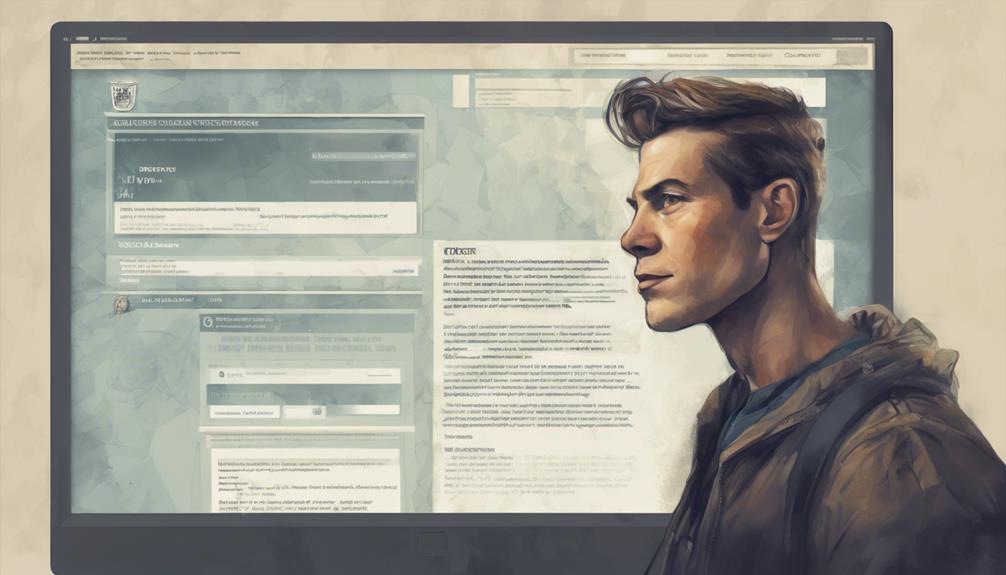Employment background checks do not impact one's credit score directly. Employers typically make soft inquiries, which do not affect credit ratings. These checks help employers assess financial behavior, but they don't influence credit scores. Instead, credit inquiries are a way for employers to view an individual's approach to finances. To understand more about how background checks work and what information they reveal, further exploration of credit reports, credit scores, and the background check process is beneficial.
Key Takeaways
- Background checks do not impact credit scores.
- Employers conduct credit inquiries for financial behavior.
- Credit history discrepancies can raise concerns during hiring.
- Employers assess financial reliability over 4-7 years.
- Credit history checks help employers make informed decisions.
Impact on Credit Scores

Credit inquiries for employment purposes don't negatively impact an individual's credit score. When employers check an individual's credit history for background checks, it's considered a soft inquiry and doesn't affect their credit score.
These credit checks provide employers with a detailed view of the individual's financial behavior without revealing their actual credit scores. Despite this, discrepancies in credit history may still raise questions during the hiring process.
Employers typically look at credit history spanning 4-7 years to assess an individual's financial reliability. This process helps employers make informed decisions regarding the individual's suitability for the job.
As a result, individuals can rest assured that having their credit history checked for employment purposes won't have a direct negative impact on their credit score. It serves as a tool for employers to evaluate an individual's financial responsibility and trustworthiness without affecting their creditworthiness.
Types of Background Checks
One vital aspect of background checks involves verifying the applicant's identity through official documents and records. This process confirms the accuracy of the information provided and helps maintain the security of the organization.
In addition to identity verification, background checks encompass various other types of screenings. Employers often conduct credit checks to assess an individual's financial responsibility, especially for roles that involve handling finances or require security clearance. Criminal history screenings are also common, particularly for positions involving trust or security.
Driving records are scrutinized for roles that involve operating vehicles to guarantee the safety of both employees and the public. Moreover, background checks might include professional license verification to confirm the validity of certifications and educational backgrounds.
These different types of background checks play a pivotal role in evaluating candidates for specific job requirements, ensuring the employer's credit utilization is in safe hands.
Employer Credit Check Process

Employers typically include credit checks as part of the pre-employment background screening process. Before running a background check that involves credit score means, employers must obtain permission from the job applicants as mandated by the Fair Credit Reporting Act. In industries dealing with finances or sensitive information, employer-conducted credit checks are quite common. When employers conduct these checks, they receive a modified credit report that provides a summary rather than full details. Job applicants who refuse credit checks may raise concerns for potential employers during the hiring process.
| Key Points | Employer Credit Check Process |
|---|---|
| Inclusion in Background Checks | Credit checks are commonly part of pre-employment screenings. |
| Permission Requirement | Employers need permission before running a credit check. |
| Modified Reports | Employers receive a summarized version of the credit report. |
Legal Rights of Job Applicants
Job applicants hold the legal right to provide explicit consent before potential employers can conduct credit checks.
The Fair Credit Reporting Act protects job seekers by regulating the use of their credit information during the hiring process.
Certain states have implemented specific restrictions on how employers can utilize credit reports when making hiring decisions.
Consent for Credit Checks
Before conducting credit checks on potential hires, employers are legally required to obtain written consent from job applicants. This requirement is in line with the Fair Credit Reporting Act, which aims to protect the credit information of job applicants during background checks.
Job applicants must provide explicit written permission for employers to access their credit reports, ensuring transparency in the process. Additionally, some states have specific regulations that limit the use of credit information in making hiring decisions, further safeguarding the rights of job seekers.
Employers are obligated to give separate notice to job applicants before pulling their credit reports for background checks, allowing applicants to understand and authorize the use of their credit information.
Protection Under FCRA
Under the Fair Credit Reporting Act (FCRA), job applicants are granted legal protection for their credit information during background checks. This protection under FCRA guarantees that employers can't misuse or access credit information without the explicit written consent of the applicant.
To safeguard job applicants' credit information, FCRA regulations mandate that employers must provide separate notice before conducting credit checks as part of the hiring process. Additionally, employers must adhere to specific restrictions set forth by the FCRA to prevent unauthorized use of credit reports during background checks.
State-Specific Restrictions
Some states impose specific regulations regarding the use of credit information in hiring processes, safeguarding the legal rights of job applicants. In these states, employers must adhere to state-specific restrictions when considering credit information in making hiring decisions.
Job applicants are protected by laws such as the Fair Credit Reporting Act, which mandates that individuals provide written permission for employers to conduct credit checks. Additionally, before running a credit check, employers must inform applicants separately and obtain explicit consent.
While individuals have the right to refuse credit checks as part of pre-employment background screenings, some employers in roles where credit checks are customary may view such refusal unfavorably during the decision-making process. This delicate balance between the legal rights of job applicants and the needs of employers underscores the importance of understanding state-specific regulations surrounding the use of credit information in hiring processes.
Credit Report Vs. Credit Score

Credit reports provide a detailed overview of an individual's credit history, including account information and payment patterns.
On the other hand, credit scores offer a numerical evaluation of creditworthiness, ranging from 300 to 850.
Understanding the distinction between these two factors is essential in comprehending how they can influence decision-making processes.
Score Vs Report
When comparing a credit report to a credit score, it's important to understand that they serve different purposes in evaluating an individual's financial background.
While a credit report provides a detailed account of credit history, including account information, balances, and payment history, a credit score is a numerical representation of creditworthiness ranging from 300 to 850.
Credit reports showcase open lines of credit, outstanding balances, payment history, foreclosures, bankruptcies, and collection accounts.
Credit scores summarize creditworthiness based on various factors, giving lenders a quick overview of an individual's financial health.
Employers often rely on credit reports, not credit scores, to assess an individual's financial responsibility and history when conducting background checks. Employers don't have access to credit scores but can explore the detailed credit history provided in credit reports to make informed decisions about an individual's financial background.
Impact on Decisions
Employers base their decisions on applicants' financial responsibility by relying on detailed credit reports rather than credit scores. Credit reports offer a thorough view of individuals' credit history, including open credit lines, outstanding balances, and payment history over the past 4-7 years. This information allows employers to evaluate how responsible an individual is with managing their finances. On the other hand, credit scores, while essential for lenders to determine creditworthiness, remain unseen to employers during pre-employment background checks.
To better understand the impact of credit reports and credit scores on decisions, consider the following table:
| Aspect | Credit Reports |
|---|---|
| Information | Detailed overview of credit history, including open credit lines, outstanding balances, and payment history. |
| Used by | Employers for evaluating financial responsibility. |
| Visibility | Visible to employers during pre-employment background checks. |
| Impact on Score | Does not affect credit scores; employers conduct soft inquiries. |
Information Revealed in Credit Checks
Detailed information on an individual's financial history is exposed through credit checks in background screenings. This process uncovers a variety of vital details that employers may consider when evaluating a candidate's financial responsibility.
The information revealed in credit checks includes:
- Open lines of credit, providing insight into the individual's current financial obligations.
- Outstanding balances on existing credit accounts, indicating the extent of debt the individual carries.
- Payment history, showcasing how consistently the individual meets their financial obligations.
Employers can also gain access to more in-depth financial information such as foreclosures, bankruptcies, and collection accounts. While credit scores aren't disclosed in these reports, a thorough credit history is made available to help employers assess an individual's financial background accurately.
This detailed examination can aid employers in making informed decisions regarding a candidate's suitability for a particular role.
Background Check Components

What key components are typically included in background checks? Background checks commonly involve identity verification, criminal records, educational degrees, employment history, and driving record information.
In some cases, these checks also encompass credit report details to evaluate financial responsibility. The incorporation of a credit check alongside a background check offers an all-encompassing view of an individual's background and financial behavior.
Employers, lenders, and landlords often request credit checks to assess an individual's financial responsibility and risk level accurately. Understanding how to interpret and review credit reports is essential for individuals undergoing background checks that involve credit information.
Frequently Asked Questions
Can a Background Check Lower Your Credit Score?
A background check cannot lower a credit score. Employers review an individual's credit history for financial responsibility, not to impact their credit score. Soft inquiries, like those from employers, do not affect credit scores.
Can a Criminal Record Affect Your Credit Score?
A criminal record generally does not directly impact one's credit score. However, incarceration or legal issues related to a criminal record could potentially affect credit if it leads to unpaid bills or financial problems.
Can I Be Denied a Job Because of My Credit?
Yes, an employer can deny a job due to poor credit history, especially for financial or money-handling roles. While this decision may not impact credit scores directly, it highlights the importance of maintaining good financial standing.
Does Employment Show on a Credit Report?
Employment information does not appear on credit reports. Credit reports primarily contain credit-related data such as accounts, payment history, and inquiries. Employers do not provide job details to credit bureaus, so a credit score is unaffected by employment status.
Conclusion
To wrap up, background checks can have a significant impact on your credit score, so it's important to be aware of the process and your rights as a job applicant.
Remember, your credit score is like a mirror reflecting your financial history and responsible habits.
Stay informed, stay prepared, and don't let a background check surprise you when it comes to securing your dream job.









